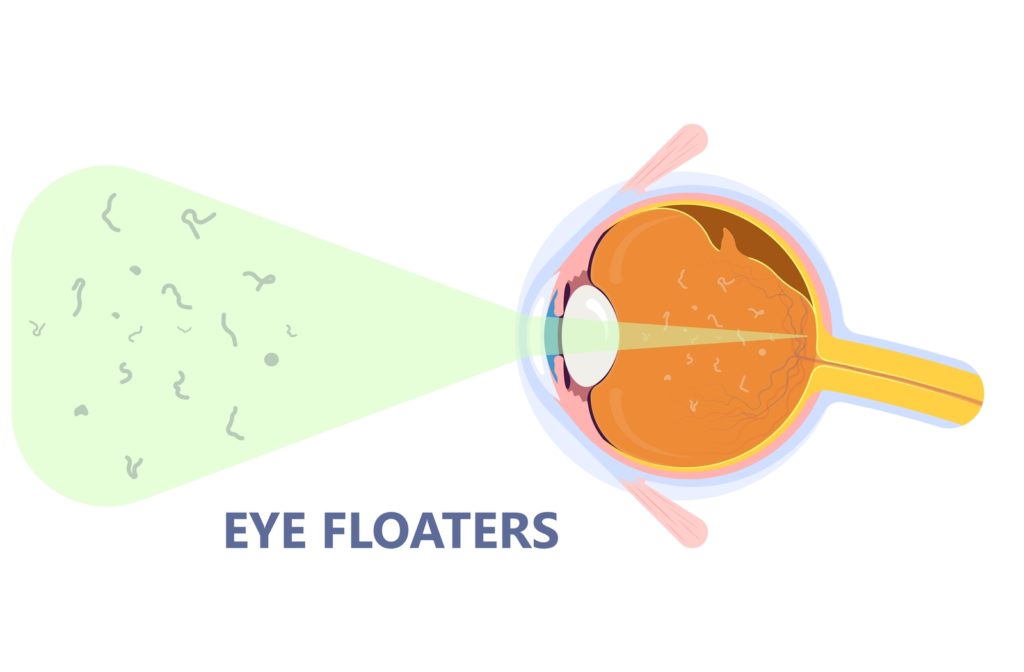Why floaters and flashes happen

Seeing “snowflakes” or lightning streaks in your vision out of the blue? Don’t ignore it—your retina could be in trouble.
Floaters look like dots, cobwebs or threads drifting across your vision. Flashes look like brief lightning streaks, often at the side of the eye. With age, the gel in the eye (vitreous) shrinks and can tug on the retina—this is common, but a sudden shower of new floaters and/or flashes can signal a retinal tear or detachment and needs urgent assessment. American Academy of Ophthalmology
Red-flag symptoms — seek same-day care

Please get your eyes checked immediately (today) if you notice any of the following, even if there’s no pain:
- A sudden burst of new floaters
- New or worsening flashes of light
- A dark shadow/“curtain” moving across your vision or loss of side vision
- Symptoms after eye injury or recent eye surgery (e.g., cataract)
These signs can indicate a retinal detachment, which is an emergency because delayed treatment increases the risk of permanent vision loss. Go to an eye doctor or the Emergency Department straight away. National Eye InstituteMayo Clinic
Who is at higher risk?
Risk is higher if you have severe short-sightedness (high myopia), diabetic eye disease, a family history or past detachment, or you’ve had eye trauma or eye surgery (including cataract surgery). National Eye Institute
What happens at the clinic?
Expect a dilated eye examination so we can see the retina properly. We may also use ultrasound or OCT scans if needed. Early detection lets us treat small tears before the retina detaches. National Eye Institute
Treatments that save sight
- Laser or freezing treatment (cryopexy) to seal a retinal tear
- Surgery (such as vitrectomy, scleral buckle or pneumatic retinopexy) to reattach a detached retina
Outcomes are best when treated early. National Eye Institute
“Could it just be migraine?”
Sometimes zig-zag lights or “heat-wave” patterns (often both eyes, 10–20 minutes) are migraine aura. But because symptoms can overlap, new or unusual flashes still need an eye exam to rule out a retinal tear. store.aao.org
If you’re in PJ/KL and this just started
Don’t wait. Come to Assunta Hospital’s Emergency Department or contact our eye clinic for a same-day assessment. We’ll examine your retina and guide you on the next steps.
Quick checklist (save this)
- New shower of floaters? Yes → Emergency eye check today
- Flashes of light? Yes → Emergency eye check today
- Dark curtain/side vision loss? Yes → Emergency NOW
- Recent trauma or cataract surgery + any of the above? Emergency TODAY National Eye Instituteretinaspecialty.com
FAQ (short & practical)
Can I sleep on it and see tomorrow?
No. A retinal detachment is time-sensitive. Same-day assessment is safest. RACGP
Will floaters go away?
Benign floaters may fade over weeks, but sudden many floaters need ruling out of a tear first. Mayo Clinic
Is it always both eyes?
Not necessarily. Retinal problems often start in one eye. If you get symptoms in either eye, get checked. National Eye Institute
About Dr. Katherine Seng (Eyekath)
Dr. Seng is an ophthalmologist at Assunta Hospital, Petaling Jaya. We provide urgent assessment for retinal symptoms and comprehensive eye care tailored to Malaysians.



Leave a Reply